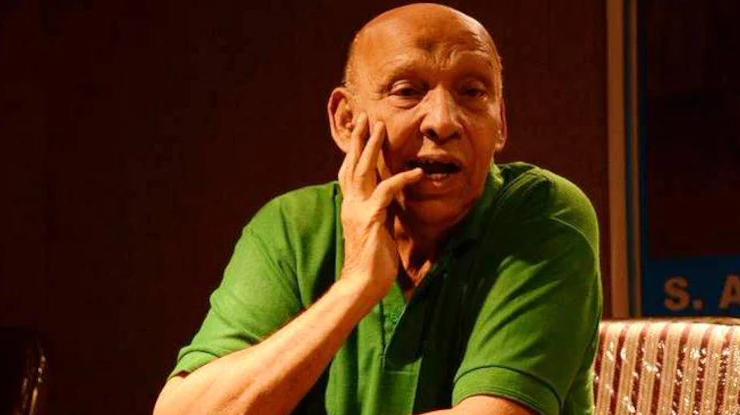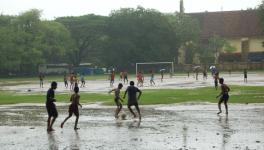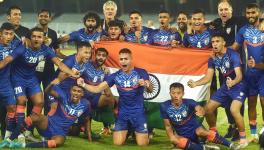Syed Shahid Hakim Obituary: Soldier, Referee, Coach, Administrator and an Indian Football Olympian

As a referee Syed Shahid Hakim supervised more than 30 international matches in the 1970s and '80s -- a considerable achievement since those days the number of matches at the Asian level were far less than what it is now.
John Bradman decided to change his surname to Bradsen in 1972 because he felt his father Sir Don Bradman’s name and fame as a cricketer was creating an acute identity crisis for him.
If there was anyone in Indian football who could have been tempted to follow Bradman junior, it was Syed Shahid Hakim, who passed away on Sunday, August 22, at the age of 82.
A 1960 Olympian, a former FIFA referee and a fairly successful coach at the domestic level, Hakim’s achievements received recognition in 2017 when he was conferred with the prestigious Dhyan Chand award. Yet, Hakim Saab, as he was popularly addressed, remained primarily known to the Indian football fraternity as the son of Syed Abdul Hakim, the legendary coach from Hyderabad.
Also Read | Amit Khatri Wins Silver in 10k Race Walking at U-20 World Athletics Championships
But make no mistake. Hakim never wanted to follow the example of Bradman’s son. Simply because he was proud to be the son of a father who twice guided India to gold medals at the Asian Games and a fourth place finish in the 1956 Olympics. Hakim’s biggest complaint was that his father didn’t receive the recognition he truly deserved, especially from the national body, something that made him a bitter critic of the All India Football Federation (AIFF) throughout his life.
At the same time, Hakim was desperate to have an identity of his own in Indian football. It could perhaps be one of the reasons why he tried his hand in almost every branch of the game – as a player, referee, coach, commentator and administrator. No doubt, he did a more than a decent job every time, something he always proudly pointed out, though he really excelled as one of India’s top FIFA referees in the 1970s and 1980s. As a referee he supervised more than 30 international games. It was considered a big achievement those days since the number of internationals were far and few at the Asian level.
The old timers would remember how in one of the Nehru Cup encounters in the 1980s in Kochi, Hakim refused to start the match till the time spectators sitting on the sidelines were cleared. He was requested and was nearly threatened by the local organizers not to act so tough, but Hakim remained unmoved.
A good midfielder (known as half-back then) in his playing days, Hakim received his commission in the Indian Air Force in 1962. Though once approached by the three Kolkata giants to play for them when he was posted at the Air Force Station in Barrackpore, Hakim could not take up the offers because of his service commitments. Thereafter, he remained a permanent figure in the IAF side for many years and represented Services in the Santosh Trophy regularly.
Also Read | OM Nambiar - The Coach Who Defined and Redefined PT Usha
Hakim did a good job as a coach, too. He resigned from the IAF in 1983 as the Squadron Leader to join Sports Authority of India (SAI) and rose to the rank of regional director before he retired. He then took up coaching on a full-time basis and had been the coach of big teams like Salgaocar FC and Mahindra United. Hakim would best be remembered for guiding Mahindra to Durand Cup triumph in 1998. The triumph over mighty East Bengal with a bunch of relatively young players was a memorable victory at Delhi’s Ambedkar Stadium.
Yet, despite all his notable on-field performances, Hakim got stuck in controversies throughout his career. It began when he was picked for the 1960 Rome Olympics team and it didn’t end even when he retired from the SAI after a bitter showdown with the highest authorities. Always ready to fight it out, Hakim would hotly contest, be it in private or public, whenever the issues would come up.
Hakim’s selection for the Rome Olympics was perhaps one of the most controversial choices in Indian football history. Far more inferior players had donned the national colour before and after 1960, but Hakim’s inclusion raised a storm because his father was the coach. It inflicted permanent damage on both father and son. While Rahim’s impeccable reputation was very much on the line, Hakim had to carry the stigma of an “undeserving” Olympian throughout his life.
It remains a mystery how Rahim picked up a couple of Hyderabad footballers, Hakim and S Hamid, for the final squad. Both were too young and yet to reach the level where they could be clubbed with superstars like Chuni Goswami, PK Banerjee, Jarnail Singh, Arun Ghosh, Peter Thangaraj, Yousuf Khan and others. Naturally, Rahim was under attack and was straightaway accused of nepotism.
Also Read | Indian Mixed Relay Team Wins Bronze in U-20 World Athletics Championships
Arumainayagam I, a member of the 1962 Asian Games gold medal winning team, however, strongly defended the coach’s decision. “Rahim Saab was attacked without reason. I watched Hakim and Hamid play for Osmania University in the inter-university meet that year and both were very impressive. I didn’t see any reason why they won’t be promoted,” Arumainayagam told this correspondent once.
Many years later, Hakim narrated a story to this correspondent that confirmed Rahim knew his selections could raise a few eyebrows. During the 1960 preparatory camp in Kolkata, Rahim one day called both Hakim and Hamid and gave them two separate sheets of papers, neatly folded and asked them to read later.
Hakim, who was often called a flat-footed footballer, returned to the team hotel and opened the paper. It read: “Hogi raftar dugna sufi/toes por daurna agar sikha.” Hamid, who lacked off the ball qualities, found a different couplet: “gaind se khelna nahi muskil/gaind bin khelkar jara dekho.”
With the death of Hakim, Indian football lost yet another representative of the golden era when there was no dearth of quality players good enough at the international arena. If Hakim was a critic of the present system it was not without reasons. He was pained at the lack of competitions at the domestic level and said footballers would improve only if they played matches. “People who are managing football in India now are doing it with borrowed ideas. They are not aware of the ground realities,” Hakim would often say. It regularly landed him in trouble but he was determined to air his views.
A man of fantastic memories, Hakim was a treasure-trove of information and anecdotes on Indian football since he Independence. His enviable technical knowledge also made him very special among the old timers. With his demise Indian football has lost a piece of history.
Get the latest reports & analysis with people's perspective on Protests, movements & deep analytical videos, discussions of the current affairs in your Telegram app. Subscribe to NewsClick's Telegram channel & get Real-Time updates on stories, as they get published on our website.
























